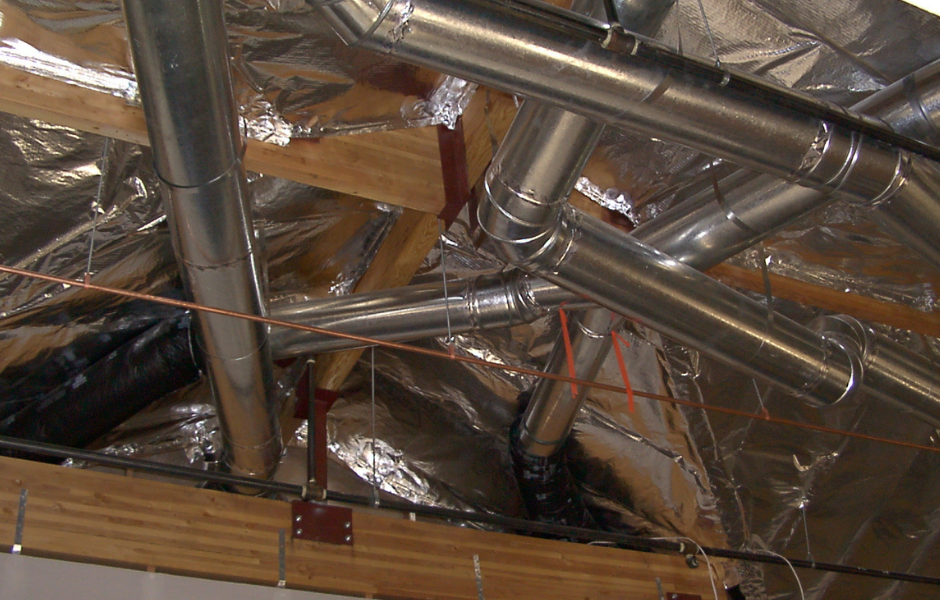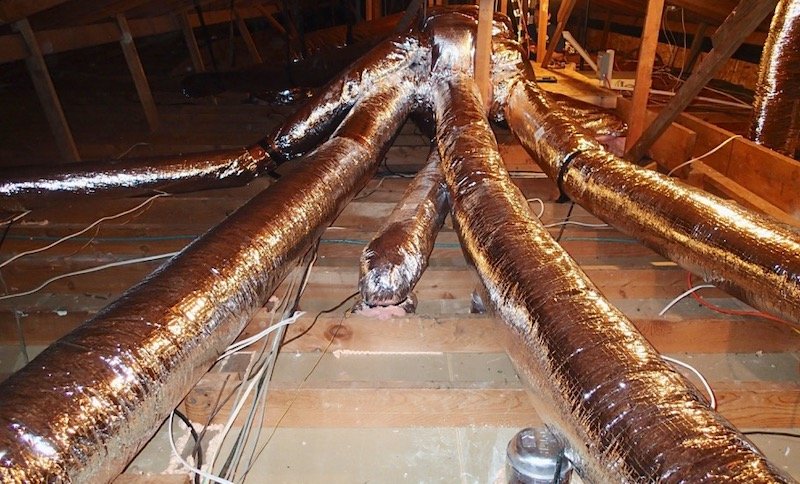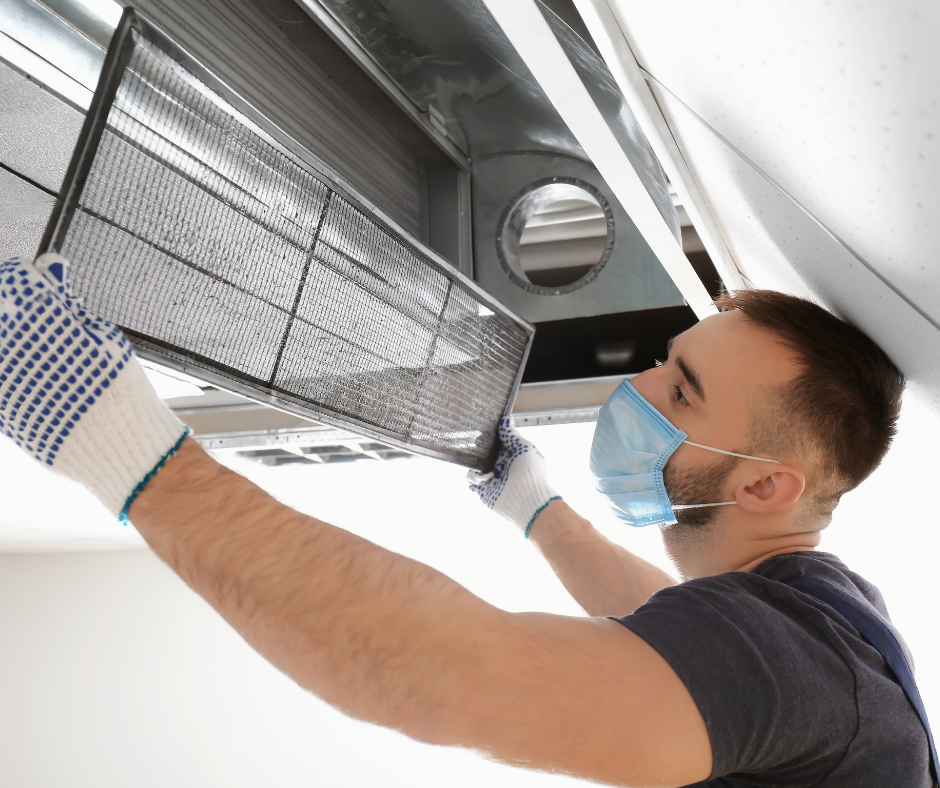Have you ever noticed that some rooms in your house are always warmer or colder than others, no matter what temperature you set on your thermostat? Well, the culprit might just be improperly designed or installed ductwork. Yes, those seemingly inconspicuous ducts running behind your walls and under your floors can actually cause pressure imbalances, leading to those frustrating hot or cold spots in specific areas of your home. In this article, we will explore the impact of poorly designed or installed ductwork and learn how it can disrupt the comfort of your living space. So, grab a cup of tea, sit back, and let’s uncover the secrets hiding within your walls!

This image is property of veteranshvac.com.
1. Importance of Properly Designed and Installed Ductwork
Properly designed and installed ductwork plays a crucial role in the overall functionality and efficiency of your HVAC (Heating, Ventilation, and Air Conditioning) system. It ensures that air is distributed effectively and efficiently throughout your home, creating a comfortable indoor environment. Let’s explore the importance of properly designed and installed ductwork in detail.
1.1 Ensuring Proper Airflow
One of the primary purposes of ductwork is to distribute conditioned air from the HVAC system to all areas of your home. Properly designed ductwork ensures that airflows properly, reaching every room and corner of your living space. This even distribution of airflow helps maintain consistent temperatures throughout your home and prevents hot or cold spots.
1.2 Maintaining Comfortable Indoor Temperatures
Having properly designed and installed ductwork is essential for maintaining comfortable indoor temperatures. When your ducts are functioning optimally, heated or cooled air reaches every room, ensuring that you and your family can enjoy a consistent and comfortable living environment year-round. This prevents the inconvenience of dealing with excessively hot or cold areas within your home.
1.3 Maximizing Energy Efficiency
Properly designed and installed ductwork also plays a vital role in maximizing energy efficiency. When ducts are poorly designed, improperly sealed, or have leaks, it can result in significant energy loss. This means that your HVAC system will have to work harder to compensate for the lost air, leading to increased energy consumption and higher utility bills. By ensuring that your ductwork is well-designed and properly installed, you can minimize energy waste and reduce your overall energy costs.
1.4 Reducing HVAC System Noise
In addition to maintaining airflow and temperature control, properly designed and installed ductwork can also reduce unwanted noise from your HVAC system. When ducts are improperly designed or installed, they can generate vibrations and noise as air flows through them. This can be disruptive and cause discomfort in your living space. Properly designed and installed ductwork helps minimize these noises, allowing for a quieter and more peaceful environment.
2. Causes of Pressure Imbalances in Ductwork
Pressure imbalances in ductwork can lead to uneven air distribution and result in hot or cold spots in specific areas of your home. To address these issues, it is important to understand the common causes of pressure imbalances. Let’s explore them in detail.
2.1 Poor Duct Layout and Design
The layout and design of ductwork are critical factors in maintaining proper airflow and avoiding pressure imbalances. If the layout is poorly planned or if the ducts have too many twists and turns, the airflow can be disrupted. This can cause pressure imbalances and result in uneven heating or cooling throughout your home.
2.2 Inadequate Duct Sizing
Proper duct sizing is crucial for maintaining the desired airflow and preventing pressure imbalances. If the ducts are too small, it can restrict the airflow, leading to increased resistance and pressure imbalances. On the other hand, oversized ducts can cause reduced airflow velocity, which can result in inadequate heating or cooling in certain areas.
2.3 Improper Duct Installation
In addition to layout and sizing, the installation of ductwork is also critical. Improper installation techniques can lead to connection issues, gaps, or leaks in the ducts, causing air leakage and pressure imbalances. It is important to hire professionals who have expertise in duct installation to ensure efficient and balanced airflow throughout your home.
2.4 Air Leaks in Ductwork
Air leaks are a common cause of pressure imbalances in ductwork. Even small leaks can significantly impact the overall performance of your HVAC system. Leaks can occur due to poor duct sealing, damaged ductwork, or improper connections. Air leaks lead to air loss, which disrupts the airflow balance and can result in inconsistent heating or cooling throughout your home.
2.5 Blocked or Restricted Vents
Blocked or restricted vents can also contribute to pressure imbalances. When vents are obstructed by furniture, curtains, or other objects, it restricts the airflow, causing pressure imbalances and uneven distribution of heating or cooling. It is important to keep vents clear and ensure that they are not obstructed in any way to maintain a well-balanced airflow.
3. Effects of Pressure Imbalances on Indoor Climate
Pressure imbalances in ductwork can have significant effects on the indoor climate of your home. Let’s explore the various effects in detail.
3.1 Hot Spots in Certain Areas
One of the primary effects of pressure imbalances is the occurrence of hot spots in certain areas of your home. When there is an insufficient supply of heated or cooled air in a specific area, it can result in that area being noticeably warmer than the rest of the house. This can make the affected area uncomfortable and inconvenient for occupants.
3.2 Cold Spots in Certain Areas
Similarly, pressure imbalances can also cause cold spots in certain areas of your home. When there is inadequate airflow to a particular room or section, it may not receive sufficient heating or cooling, resulting in colder temperatures compared to the rest of the house. This can make the affected area uncomfortable and may require supplemental heating or cooling measures to address the issue.
3.3 Fluctuating Temperatures
Another effect of pressure imbalances is fluctuating temperatures throughout your home. When the airflow is not properly balanced, the temperature in various areas can vary significantly. This can lead to constant adjustments of thermostat settings to compensate for the temperature differences, causing discomfort and inconvenience for you and your family.
3.4 Inconsistent Air Distribution
Pressure imbalances in ductwork can also result in inconsistent air distribution. Some areas may receive an excessive amount of airflow, while others may not receive enough. This inconsistency can result in uneven heating or cooling throughout your home, making certain areas less comfortable than others. Properly designed and installed ductwork ensures a balanced and consistent airflow to all areas of your living space.
4. Signs of Pressure Imbalances in Ductwork
Identifying the signs of pressure imbalances in your ductwork is crucial for prompt detection and resolution of the issue. Let’s explore some common signs to look out for.
4.1 Temperature Variations Throughout the House
One of the initial signs of pressure imbalances is temperature variations throughout your home. If you notice significant differences in temperatures between rooms or areas, it may indicate that certain areas are not receiving adequate heating or cooling. Monitoring and taking note of these temperature variations can help you identify potential pressure imbalances in your ductwork.
4.2 Uneven Airflow from Vents
Uneven airflow from vents is another noticeable sign of pressure imbalances. If you feel that some vents are providing more air while others are barely releasing any, it suggests that the system is not correctly distributing air. Conducting a thorough check of airflow from all vents in your home can help identify potential pressure imbalances.
4.3 Unusual HVAC System Noises
Pressure imbalances can often lead to unusual noises coming from your HVAC system. If you notice banging, whistling, or other unusual sounds when the system is running, it may indicate ductwork issues. These noises can result from air being forcefully pushed through restricted or improperly sized ducts, signaling the presence of pressure imbalances.
4.4 High Energy Bills
A sudden increase in your energy bills can be a sign of pressure imbalances in your ductwork. When the HVAC system is struggling due to pressure imbalances, it consumes more energy to compensate for the lack of airflow. This increased energy consumption leads to higher utility bills. Keep an eye on your energy bills and consider investigating potential pressure imbalances if there is a significant and unexplained increase.

This image is property of i0.wp.com.
5. Importance of Professional Ductwork Evaluation and Repair
To effectively address pressure imbalances in your ductwork, it is essential to seek professional evaluation and repair services. Let’s explore the importance of enlisting the help of experienced professionals.
5.1 Conducting an HVAC System Inspection
Professional ductwork evaluation begins with a comprehensive inspection of your entire HVAC system. This inspection helps identify any potential issues, including pressure imbalances, that may be affecting the performance of your system. By conducting a thorough inspection, professionals can understand the specific requirements of your ductwork and determine the appropriate corrective measures.
5.2 Identifying Pressure Imbalances
A professional evaluation allows experts to accurately identify and diagnose pressure imbalances in your ductwork. Through specialized tools and techniques, they can analyze the airflow, identify air leaks, assess duct sizing, and determine the root causes of pressure imbalances. This detailed evaluation ensures that the correct problems are addressed, leading to effective solutions.
5.3 Determining Root Causes
Correctly identifying the root causes of pressure imbalances is essential to ensure long-term solutions. Professionals have the expertise to determine whether the issues result from poor duct layout, inadequate sizing, improper installation, duct leakage, or blocked vents. This knowledge enables them to develop a targeted plan for resolving the pressure imbalances and restoring optimal airflow within your home.
5.4 Implementing Corrective Measures
Once the inspection is complete and the root causes are identified, professionals can implement the necessary corrective measures. Whether it requires duct resizing, sealing, insulation installation, or vent clearing, professionals have the skills and knowledge to undertake these tasks effectively. By hiring experts, you can trust that the necessary repairs and adjustments will be conducted properly, ensuring long-lasting results.
6. Solutions for Resolving Pressure Imbalances in Ductwork
Addressing pressure imbalances in your ductwork requires implementing specific solutions. Let’s explore some effective measures that professionals can undertake to resolve the issue.
6.1 Proper Duct Layout and Design
Improving the duct layout and design is essential to optimize airflow and resolve pressure imbalances. Professionals can review your current duct layout and propose revisions that maximize efficiency. By ensuring proper branch connections, minimizing twists and turns, and optimizing the routing, they can achieve a well-balanced airflow throughout your home, reducing hot or cold spots.
6.2 Correct Duct Sizing
Proper duct sizing is crucial for achieving balanced and efficient airflow. Professionals can accurately assess your ducts’ current sizing and make adjustments as needed. They ensure that the ducts are appropriately sized to match the requirements of your HVAC system, allowing for optimal airflow distribution and preventing pressure imbalances.
6.3 Professional Duct Installation
Improper duct installation is a common cause of pressure imbalances. Hiring professionals to handle the installation ensures that all connections are secure, without any gaps or leaks. They employ industry best practices and techniques to ensure that the ductwork is installed correctly, minimizing the risk of pressure imbalances and maximizing the efficiency of your HVAC system.
6.4 Duct Sealing and Insulation
Air leaks in the ductwork can contribute to pressure imbalances. Professionals can identify and seal these leaks, ensuring that air is not lost during transmission. Additionally, they can assess the insulation of your ductwork and make recommendations for improvements. Proper insulation helps maintain desired temperatures, preventing heat loss or gain, and reduces the likelihood of pressure imbalances.
6.5 Cleaning and Clearing Blocked Vents
Blocked or restricted vents can disrupt airflow and cause pressure imbalances. Professionals can clean and clear any obstructions within the vents, ensuring unobstructed airflow throughout your home. By removing dust, debris, or furniture blocking the vents, they promote optimal airflow and help maintain balanced pressure levels.

This image is property of veteranshvac.com.
7. Benefits of Addressing Pressure Imbalances
Addressing pressure imbalances in your ductwork offers a range of benefits that contribute to a well-functioning and efficient HVAC system. Let’s explore these benefits in detail.
7.1 Improved Indoor Comfort
By resolving pressure imbalances, you can significantly improve indoor comfort. Balancing the airflow ensures that each room receives the appropriate heating or cooling, eliminating hot or cold spots. This creates a consistent and comfortable environment throughout your home, allowing you and your family to enjoy optimal comfort levels year-round.
7.2 Enhanced Energy Efficiency
Properly addressing pressure imbalances contributes to enhanced energy efficiency. When the airflow is balanced and unrestricted, your HVAC system can distribute conditioned air more effectively. This reduces the need for excessive heating or cooling, leading to improved energy efficiency and lower energy consumption. Consequently, you can enjoy reduced energy bills while minimizing the environmental impact of your HVAC system.
7.3 Extended HVAC System Lifespan
Pressure imbalances can put additional stress on your HVAC system, causing it to work harder than necessary. By resolving these imbalances, you reduce the strain on your system, potentially extending its lifespan. A well-balanced airflow ensures that your HVAC system operates optimally, promoting longevity and reducing the likelihood of costly breakdowns or premature failures.
7.4 Reduced Maintenance and Repair Costs
Addressing pressure imbalances proactively can help reduce the need for frequent maintenance and repair. By resolving these issues promptly, you minimize the risk of larger problems developing in the future. This results in fewer repair or replacement costs, allowing you to save money and avoid inconveniences associated with extensive HVAC system repairs.
8. Conclusion
Properly designed and installed ductwork is essential for ensuring the functionality of your HVAC system and maintaining a comfortable indoor environment. Pressure imbalances in ductwork can lead to hot or cold spots, unstable temperatures, and inconsistent airflow. By understanding the causes and effects of pressure imbalances, you can take action to address these issues.
A thorough evaluation by professionals will help identify pressure imbalances in your ductwork and determine the root causes. Implementing corrective measures, such as proper duct layout and design, correct sizing, professional installation, sealing and insulation, and vent clearing, can restore balanced airflow and resolve pressure imbalances.
Taking prompt action to address pressure imbalances offers numerous benefits, including improved indoor comfort, enhanced energy efficiency, extended HVAC system lifespan, and reduced maintenance and repair costs. So don’t delay – prioritize the evaluation and repair of your ductwork to maintain a well-functioning HVAC system and enjoy a comfortable home environment.

This image is property of www.bluentcad.com.

